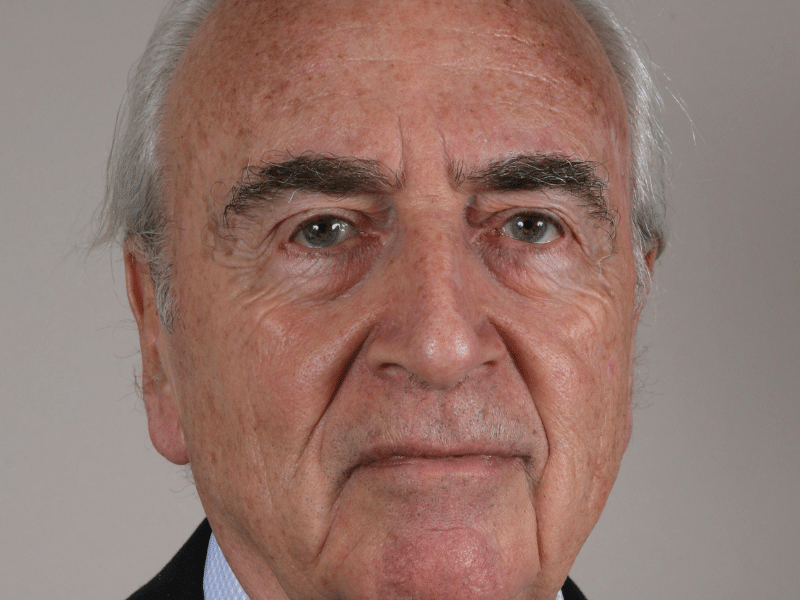
Former prime ministers and business royalty pay tribute to the remarkable businessman, politician, and philanthropist who sadly died in 2022 at the age of 90
There are successful business people, successful politicians, marvellous philanthropists and then there’s David Young. He is one of those very few who seemed equally at home in all three worlds. He was also, of course, at the start of his career, a lawyer, and to the many people who came forward to contribute to this special Finito World tribute, a loyal and valued friend, mentor and confidante. His death in December 2022 was met with the dismay and remembered affection which always accompanies the passing of an unusually productive life.
Young was born in 1932 to an orthodox Jewish family near Minsk in what was now Belarus; his family fled a pogrom there and Young’s father prospered in business, as his son would do. Naturally, he never forgot these circumstances; in her moving tribute Wendy Levene remembers his profound commitment to the Jewish Museum later in life.
David Young was admitted to be a solicitor in 1955, but it was business – or enterprise, as he would later refer to it – which was his real passion. Even in his early 20s, he was an executive at Universal General Stores. Not all successful executives can successfully found businesses but Young found he could, creating a series of companies in property, construction and plant hire, eventually selling his interest in June 1970 to Town & City Properties plc. The rest of that decade followed on a similar track; it was a tale of considerable success in business.
When Margaret Thatcher said that other Cabinet ministers came to her with problems and that Young came to her with his achievements, she didn’t add that these were numerous. But then she didn’t have to; Young, who served in her Cabinet for most of the second half of her Downing Street tenure, was always a favourite of Britain’s first female Prime Minister.
Young served successively in Thatcher’s Cabinets as Minister Without Portfolio, Secretary of State for Employment, and Secretary of State for Trade and Industry, and President of the Board of Trade. In the latter role he found his metier, racking up air miles on behalf of UK plc. His passion for business was just as relevant to that role as it was in the business world itself.
Though he would return to government to advise David Cameron on enterprise (perhaps the happiest period of his life), he also had a superb final chapter outside of government in business with Simon Alberga (who writes movingly about his friendship in these pages), and in philanthropy. By this point in life, he was a sage. People continually sought his advice; and he continually found time to offer it. His death was a sadness to all of us at Finito World. We have done our best to preserve, the example of his remarkable life is preserved in this pages.
Former Prime Minister David Cameron
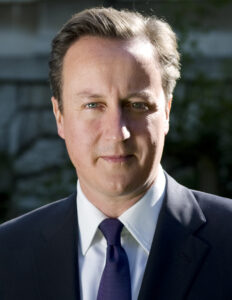
I first met David in 1988 when I worked in the Conservative Research Department covering trade, industry and energy. This meant following his department, the Department for Trade and Industry. David was famously one of Thatcher’s favourite Ministers, and you could see why. I was a 20-something researcher; he was a Secretary of State with many years’ experience. Yet he treated me with great warmth and kindness, inviting me to his weekly ‘Ministerial prayers’ meeting, where his top team discussed the challenges of the day.
Fast forward to 2010 when I became Prime Minister and one of my biggest challenges was bringing down the barriers to business that were preventing our economy from growing. I knew exactly who I wanted to help me in this endeavour. I called up David Young and invited him back into government as my Enterprise Adviser. Fortunately, he agreed. From his office in 10 Downing Street he produced report after report which led to concrete reforms, such as start-up loans, that truly helped to kickstart growth in our country.
David was my oldest adviser, but he was one of the most dynamic. It was wonderful having him around No10 and being able to call on his advice and wisdom. His legacy lives on in all those businesses he helped to get off the ground, all the policies he helped to drive forward, and all the people – like me – who he inspired during his four decades in public service. He will be much missed but very fondly remembered.
Former Prime Minister Lady May
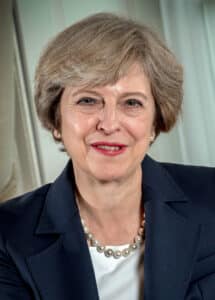
Image ©Licensed to i-Images Picture Agency. 01/08/2016. London, United Kingdom. Prime Ministers Official Portrait. Picture by Andrew Parsons / i-Images
David Young was a remarkable man, constantly enthusiastic and brimming with ideas. Crucially these were ideas that led to action which improved the lives of people here in the UK. He was a consistent champion of enterprise and an invaluable adviser to a number of Conservative governments and Prime Ministers. I never met David without him coming up with a new proposal for boosting the economy, encouraging new business or helping young people. His energy and interest in others, together with his passion for enterprise, were infectious and have left a lasting legacy for so many. It was a privilege to have known him.
Lord Cruddas, businessman and philanthropist
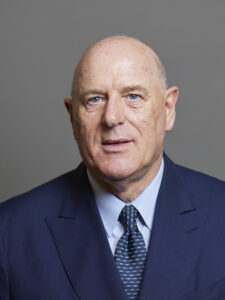
I met Lord Young when he was Chairman of the Trustees for the Prince’s Trust; it was around 2006. I had created the Peter Cruddas Foundation and I wanted to donate to good causes. At that point, I met Lord Young and instantly took a great liking to him – partly because of his political background. I’m a big Margaret Thatcher fan, because of the way in which she transformed the country. As I knew David had been in her Cabinet, I was awe-struck to meet him.
But he turned out to be charming – a lovely man, and very down-to-earth. I donated to the Prince’s Trust. Here was a man who was willing to sit down, talk to me, help me, guide me, and mentor me. We became great friends. I invited him to be the Chairman of my Foundation and he introduced me to the lawyer Martin Paisner who helped also.
Over time, our friendship developed. I went to his house in Graffham and became friends also with his lovely wife Lita, Lady Young. At his house in Graffham, there was a Spitting Image puppet of David himself in his study which his family had managed to get hold of, and which I thought was very funny.
David also introduced me to opera. When you come off a Hackney council estate, you don’t often go to the Royal Opera House in Covent Garden; he took time to explain the music to me, and today, whenever I go to the opera, I think of him.
He was very smart on technology. I remember at his 80th birthday party, one of his grandchildren gave a speech saying that he was one of the few grandchildren who go to their grandfather for technological advice: David could fix anything. Imagine being in your eighties and embracing all this new technology – mobile phones and computers and so on. You always learned about technology from Lord Young.
I’m very sad that he has passed away. But I take comfort in the thought that he had a good and rewarding life. I’m proud to say he was one of my dear friends. But really it was more than that: he was like the father I never had.
Ronel Lehmann, Chief Executive of Finito Education
Lord Young was a legend. David was often to be seen at high-profile business, political, charitable and other community events. He was the one person that every entrepreneur queued up to meet, either to seek his opinion, share news about a deal or development or just to shake his hand. He had time and always made time for you. He always reached out to those who need a helping hand, the old-fashioned way.
I remember when I was thinking of setting up Finito in 2016, I made an appointment to see him at his offices overlooking Regent’s Park. He liked the purpose that we had set ourselves to help young people find their meaningful career before reminding me of his own passion for the Enterprise Passport, a digital record of activities which he championed for young people to help underpin their own career prospects. It was a genius idea never adopted by Government to record pupils through school and beyond about their career development for prospective employers seeking proven employability skills. Earlier this year, we remembered his contribution and paid tribute to his vision at the launch meeting of the AAPG on The Future of Employability.
We first met many years before when Lord Young was appointed Chair of the British Israel Chamber of Commerce (now UK Israel Business). He penned a letter to his fellow long-standing Board of Directors thanking us all for our service and then asking us for our immediate resignations. I replied, “Dear David, No, Yours, Ronel,” and then continued to serve under his stewardship for many more years. David retorted that he liked to sort the wheat from the chaff. We laughed about it every time we met, and I took pleasure reminding him.
He had an office at 10 Downing Street under David Cameron’s Premiership and relished holding meetings there to discuss the latest business topics. On one occasion, we sat there drinking the worst coffee ever, but he was so engaged about the issues, it never mattered.
In his last email exchange with me, I shared with David a letter I had submitted to The Times, praising his idea of the Enterprise Passport. Sadly, it had been rejected, but I wanted to share the letter, and so wrote to him copying in his niece Imogen Aaronson, to whom David had recently introduced me.
His response was characteristically funny and kind. “Thank you very much for the thought, pity the Letters Editor did not have your taste and judgment! I am not sure what you two are plotting together but you both are in good hands. Take care and stay safe.” I will miss his smile and bow tie.
Sir Lloyd Dorfman CVO CBE
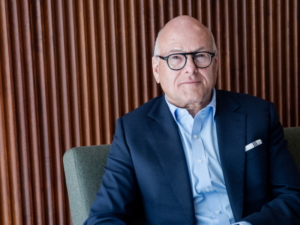
One of David’s catchphrases was “Life’s a bicycle – stop peddling, and you fall off!” It was a phrase I often quoted and it encapsulated the man. Well after the point most people have retired, he continued to combine a dizzying mixture of commercial, public service and charity commitments.
My relationship with David straddled social, charity and business worlds. It reflected the diversity and depth of his life and work. Over time, he became a mentor and a friend, and I always valued his advice and opinions on any subject.
Whilst I knew David a little from the 1970s, it was really through my involvement in Jewish Care starting in the 1990s that I came to know him better. The charity is the Jewish community’s largest welfare organisation. David was its President and I joined the Board in 1997.
It was through the Prince’s Trust, however, that I became much closer to him. I was invited to join the charity’s Development Board in 2002, which he chaired. I soon learnt what a pivotal figure David was in the Trust’s evolution. Whilst the charity had been founded by the then Prince of Wales in 1976, David had helped accelerate its growth. He was supportive of the charity enabling young people from underprivileged backgrounds find jobs and also start businesses. As Secretary of State for Employment and then for Trade and Industry in the 1980s, he famously devised a matched fund-raising scheme to support the Trust’s enterprise work. The government ended up committing millions of pounds, much more than had been imagined, to the surprise even of his Prime Minister Margaret Thatcher.
When David stepped down from the Board in 2007, he recommended I should take his place. I went on to become Chairman of Prince’s Trust and Prince’s Trust International. Overall he played a pivotal role in the growth of the Trust to become, what is today, the King’s oldest and largest charity.
The charity links did not stop there. I served alongside David on the Board of Community Security Trust, which protects British Jews from antisemitism. David and I also ended up in business together. He brought me an opportunity to invest in an oil technology business. His enthusiasm for dynamic businesses with growth potential never dimmed.
Over the years, Lita and David became cherished friends. They joined us on one particularly memorable group holiday to the Galápagos Islands. It was the first trip there for all of us. David was an especially keen photographer and took great pride in presenting everyone with a fabulous photo album at the end of the trip. Another lovely social memory was joining him and the family for his 80th birthday weekend at his family home in Sussex. This coincided with the end of his time as Chairman of the Chichester Theatre, yet another cause David had poured his energies and talents into, originally rescuing it from closure. David enjoyed the arts and particularly loved coming to the Royal Opera House. When I became Chairman last year, he was characteristically very supportive.
On social occasions, you saw the side of David as a devoted family man. It was clear how much Lita was a rock for him, and how much he adored her. He would not have had the impact he had, without her constant support.
David was a loyal friend and an exceptional man, with so many dimensions. His legacy is his family and friends, and the many causes and charities he supported with his leadership, charisma and passion. The world will be a lesser place without him.
Simon Alberga
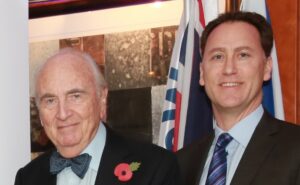
David Young lived an extraordinary life. Through my close association with him in business and communal matters over the course of 26 years, the word I would most closely associate with David is positive. Whether in the realm of business, community affairs or politics, David always approached life with a can-do attitude. In my view, this is a hallmark of successful people and a significant part of the reason David achieved so much in his life. Rather than dwelling on potential impediments to success, David always focused on the art of the possible, and invariably he was a driving force behind making things happen. David believed in the power of one’s actions to effect positive change in the world.
In the world of business, David was a committed risk-taker, and he always believed success would come through a positive approach to working with good and talented people, despite the inevitable risks associated with business ventures. He was often – though not always – right, though he was right often enough to achieve great things in business. It was, however, in areas which were particularly important to David, such as education and skills development, that he understood the need to think and act positively. David was passionately determined to help less fortunate people advance in life. David was a big part of the reason I became involved in the Jewish charity ORT, which helps people across the world with education and skills training to gain employment and provide for themselves, their families and communities. David was also a great communicator with extraordinary interpersonal skills. He was affable, generous, good-humoured and cultured. People loved to be in a room with David, chat with him and, if they were lucky, work with him. I will always cherish the 26 years of friendship, mentorship and support I received from David Young. He has left a great void in many of our lives, though if we can take forward his legacy of positivity, then we may also be fortunate enough to achieve some of the great things he achieved during the course of his extraordinary life.
Wendy Levene
Both Peter and I knew David and Lita over a number of years, meeting at charity events, mutual friends’ occasions and occasional dinners. We have regularly enjoyed each other’s company and have mutual respect for one another.
I really got to know David well when I invited him to become Chairman of the Jewish Museum London. Admittedly, it took some persuasion but I won him over and he agreed. That was in 2010.
We were in desperate need of leadership, integrity and funding. David had all of those qualities. He brought in amazing contacts and raised large amounts of funding to keep the Museum afloat. He had also been involved in other very worthy charities, Coram Trust, Chai Cancer Care and Chairman of the Chichester Festival Theatre – all remarkable institutions to which David devoted much of his time.
What was so apparent to me was that David loved the Museum and the role it played in the community. He was so proud of his Jewish roots and was determined to acknowledge the role that the Jewish people had played in this country. In his ten years as Chairman of the Museum he and I formed a great working relationship. He teased me mercilessly and always claimed it was all my fault that he was Chairman of the Museum! He loved the Museum and took the Museum out of a difficult period into much better times. David didn’t tolerate fools but admired hard work, dedication and integrity.
David is very much missed by me and many many people – he left an indelible mark on our lives. Rest in peace.
Lord Leigh of Hurley
Lord Young of Graffham was a role model and mentor for me having known him for literally all of my life: he was a friend of my late father –and my grandparents. I remember clearly when he first entered Government how unusual it was in those days for a businessman to be catapulted in to high office.
His first day in the House of Lords he spoke on training for young people, a passion for him along with tech. Then, shortly afterwards, he had to answer four questions and their supplementaries in a row: that would have been longer than PMQ’s.
I was always struck by his great humility. Despite rising to great distinction under a number of Prime Ministers, he never needed or sought praise. He knew what he was doing and he knew where he came from, always remembering and respecting his background and his community with enormous acts of philanthropy. He will be deeply missed
Chelsey Baker, Chief Executive & Founder, National Mentoring Day
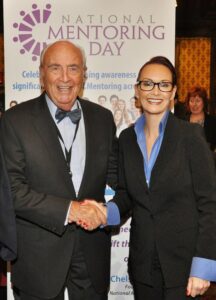
I first met Lord Young back in 2012 when I was a lead mentor for the government backed Start Up Loans scheme, which Lord Young conceived to boost entrepreneurial spirit in the UK. Entrepreneurs were given a mentor alongside a start-up loan to launch their business. Lord Young firmly believed in the value of mentoring citing, ‘The mentor is far more important than the money! That’s what made all the difference to me when I was starting out.’
I saw the impact that mentoring had on the lives of these young entrepreneurs and came up with the idea to launch National Mentoring Day to increase mentoring for all ages. Lord Young was my first choice to become our Patron. We shared a similar passion for supporting entrepreneurship and a vision for mentoring to be at the forefront of business and education.
During the inauguration of National Mentoring Day at the House of Lords in 2016, Lord Young gave the opening speech declaring, “I had a mentor when I started my first business, and he saved me more than once. I hope that National Mentoring Day will encourage more people to act as a mentor.” His words certainly left an indelible mark on everyone.
Last year saw our biggest National Mentoring Day on record. Lord Young believed in my vision to elevate all forms of mentoring and championed our mission to ensure everyone has an opportunity to reach their fullest potential with access to mentoring. For this I will be forever grateful.
Lord Young loved his bow ties and loved mentoring. The world has lost a truly great mentor, but his legacy will live on not only as our founding patron but in all the lives he touched.
Michael Hayman MBE
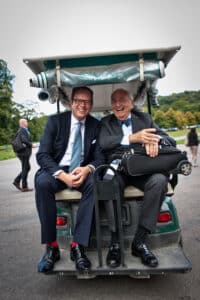
As he did for a great many, David Young brought solutions to my life and never problems.
What a privilege to have a friend who lived life to the full and made such an immense contribution to public and business life. He was one of the greats and for all of the right reasons.
We worked together on the start-up agenda during his time as enterprise advisor to the then Prime Minister David Cameron. He encouraged me and others to have a go at making a difference. The result was the national campaign for early stage firms, StartUp Britain.
As well as its contribution to UK start-ups, it would, on a personal level, usher in a great and defining friendship between us.
We had many adventures and for me it was also an opportunity to watch a master at work. I self-styled myself as his ‘bag carrier’, an incredible apprenticeship working with someone with the skill, judgement and attitude to bring people together and get things done.
He had the greatest of hearts and its pulse pumped with enthusiasm, fun and energy. It brought out the best in you. He was like instant sunshine.
That attitude I think made all the difference and was key to his incredible track record. If you look at the list of achievements in enterprise policy since 2010 you will see the hand of David Young in all over them.
He told me that those years in the run up to his retirement from government were among his happiest. Given his career roll call it was a quite a thing to say. But the reason was that it allowed him to focus on small firms, his life passion and mission to see succeed.
He would often compare and contrast with the recommendations of the Bolton report in the 1970’s that predicted a corporatist future of very large companies with little room for entrepreneurs. It was a view he did not share.
Fast forward to today and the UK is a small firms economy – five million of them and some 800,000 business registrations every year. That this is so, says much about David’s gift of prediction but also his proactive contribution to making change happen.
I interviewed him on his last day in Downing Street and remember his words: “We’ve got a good thing going unless we mess it up.” They are words that this generation of politicians would do well to heed in their appreciation of entrepreneurs when it comes to the growth of the economy.
I often find myself asking: “What would David do?” He’d probably tell me to get on with it. As he told me: “My definition of wisdom is the accumulated memory of past mistakes! “
And he also said this: “If we all focused our efforts on the journey rather than the destination the world would be a far better place.”
It was why he believed in action and lived a life vested in the defeat of problems and the pursuit of solutions. I miss my friend immensely.
Michael Hayman MBE co-founded the national campaign for early stage enterprise, StartUp Britain and chairs the Small Business Charter.